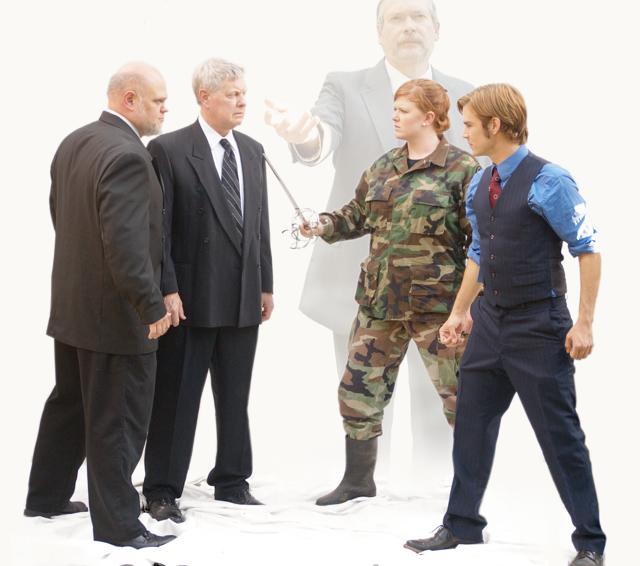“Friends, Romans, Countrymen, lend me your ears.” Words can build or destroy an empire. William Shakespeare must have been aware of this as he penned a multitude of plays about rulers and their subjects. Shakespeare studied the extant writings of Plutarch and Appian about the death of Julius Caesar for details of the political rift in the Roman Empire. Which is deadlier: absolute power, which as Shakespeare wrote in that Scottish play, “corrupts absolutely,” or the fear of that power?
Rivaling the entertainment value of the current 24-hour news cycle, Shakespeare packs in a gruesome murder, comedic relief, multiple suicides and a battle scene — although rhetoric is at the heart of this play. How do leaders sway the masses? What words will incite riot over a death that the common people first accepted as justice? After viewing a rehearsal crammed into a basement without the proper set, costumes or props, the words were what resonated. One couldn’t help comparing the speeches of Brutus and Antony to the recent “countdown to crisis” from our own government.
This is C.J. Breland’s first time directing Julius Caesar. She’s currently the theater director at Asheville High School and past credits include The Comedy of Errors for Montford Park Players, and three years of A Christmas Carol at Asheville Community Theatre (for Montford Park Players, in 2006, 2007 and 2008). Brenland talked with Xpress about bringing the play to life.
This production will be in modern dress. Why did you make that choice?
Breland: I think that something about Julius Caesar really resonates with the times we’re living in. We have well-meaning conspirators who determine that Caesar is too powerful and so overthrow him. Whether they are right or wrong, whether Caesar was right or wrong, it’s not the way things were supposed to be done in the Roman Republic. I see a lot of that right now in our country — where the party that takes power tries to seize power and use it, rather than having real dialogue and real compromise. It’s really important to me not to label either of the groups as synonymous with the Republicans and Democrats. I told the costumer there is no way that I want to see red or blue on that stage. I just want people to think about the things that they do.
It is a play full of speeches and switching sides.
Right, the citizens are so important, and I love the fact that those actors are really embracing those parts of being the citizens because they’re absolutely critical. Just like you can’t have a good musical without a chorus that’s profoundly committed to the individual people that make up that company, I don’t think that this show works without the citizenry that are turned. They are turned by rhetoric.
This play, for people who are interested in rhetoric, is loaded with all of the rules of rhetoric from that time. One of the things that historically probably caused Antony to gain the upper hand is that he was a follower of a rhetorical style that used emotion, whereas Brutus was a stoic and a person who believed that logic needed to carry the argument. The citizens, they definitely respond to emotion. You see that all the time in our modern political discourse. If someone says something with enough emotion over time, people will believe it whether there is a smidgeon of truth or not.
Historically, Shakespeare was performed by men dressed as women to play female roles. I notice you have women cast in male parts in this production. Will they be dressed as men?
No. This play is written with two women, Portia and Calpurnia. However, when you look at our politics today, we do have women. I told Renee Handley, our costumer, that I wanted to see the image of those assembled Senators and House representatives, where the women are still in suits, but stick out like bright flowers. All the men will be in dark-colored suits, and the women will have on suits that are bright.
When you decided to do this play, did you originally intend to make a modern political statement, or has that evolved in rehearsals?
Someone suggested this play last year at our summer company meeting with everybody who’s been part of Montford Park the past year. I seconded it and said that I thought it resonated with our modern political scene. Nothing has happened to convince me otherwise.
Now we are using swords, no guns. Guns are very impersonal. In the world of this play, people dress like we do now, but their weapons are swords and daggers. When they used daggers on Caesar their hands would have touched his flesh when that blade went in. With guns, a coward can shoot at someone from a distance. We never find out for sure who it is, like with Kennedy’s assassination, we can never be totally certain that Lee Harvey Oswald worked alone. With a dagger, there is something intensely personal. They’re standing behind what they believe about Caesar’s danger.
— Wendi Loomis can be reached at wendi@jazzandpoetry.com.
who: Montford Park Players
what: Julius Caesar
where: Hazel Robinson Ampitheatre, 100 Gay St. in Montford
when: Fridays, Saturdays and Sundays through Sept. 4 (7:30 p.m. Free, donations encouraged. http://montfordparkplayers.org)



Note: It’s BRELAND, not BRENLAND.
Good luck with the rest of the run, everyone!
“absolute power, which as Shakespeare wrote in that Scottish play, ‘corrupts absolutely’ . . .”
Check your quote, please.
Breland directed three productions “A Christmas Carol” for Montford Park Players that just happened to have been staged at Asheville Community Theatre.
We have corrected the misspelling of director C.J. Breland’s name, and also amended the years she directed A Christmas Carol. Apologies for the errors! Go see the play!